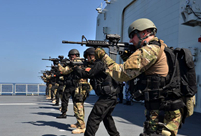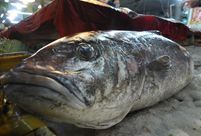 Bikini show in 2014 China Final of Miss Tourism World
Bikini show in 2014 China Final of Miss Tourism World
 Close-up view of August Aerobatic Team
Close-up view of August Aerobatic Team
 Goddesses married in 2014
Goddesses married in 2014
 Polar region photos raise worldwide awareness of global warming
Polar region photos raise worldwide awareness of global warming
 Get off at the last stop — Beijing Subway in vision
Get off at the last stop — Beijing Subway in vision
 Top 100 beauties in the world!
Top 100 beauties in the world!
 Gallery: Who is the most beautiful one?
Gallery: Who is the most beautiful one?
 If you like autumn, put your hands in the air!
If you like autumn, put your hands in the air!
 Fan Bingbing's "Queen style" in new play
Fan Bingbing's "Queen style" in new play
 Lingerie show at 2014 Miss China
Lingerie show at 2014 Miss China
VLADIVOSTOK, Russia, Dec. 20 -- A plunge in the value of the ruble has hit Russia's economy and exerted visible influence on Chinese businesses in the Far East region.
Chinese businessmen in Vladivostok, a Russian port city, told Xinhua that the depreciation of the ruble has pushed up prices of meat, fish, and grain, hurting their businesses.
Liang Xiaowei, a restaurant manager in Vladivostok, said the restaurant is facing the most difficult situation since its opening in 2001.
The restaurant has secured only 38 reservations for New Year celebrations, he said. "We used to have about 200 people celebrating the New Year in our restaurant."
Liang said the ruble's devaluation is the main reason for poor business. "I wish the situation would get better soon," he said.
Ma, another restaurant manager in downtown Vladivostok, said that the prices of meat, vegetables and dressings are going up and his restaurant is getting quiet.
"The ruble exchange rate affects not only Russians, but also the Chinese businessmen living here. We have not raised the prices in our restaurant yet, but it will happen after the New Year," he said.
Some of the Chinese businessmen trading at the Sportivnaya market, the largest trading area in Vladivostok, have closed their shops due to the devaluation of ruble.
Ran Peng is a salesman for a vegetable store, the only Chinese grocery store that remained open at the Sportivnaya market. He told Xinhua that the Chinese shops there cut off business within a week.
A new Russian market manager has said the rent would be up next year by a third or a half. "That is why they left," said Ran.
"I want to try and sell the vegetables in stock, and then decide whether to stay or leave," Ran said.
However, there are still some Chinese who believed the situation would be improved. "I believe in (Russian President Vladimir) Putin, and it will get better within six months," said yet another manager of a Chinese restaurant.
Putin is confident about China-Russia trade and economic cooperation. At an annual end-of-year press conference, he said he believed that Russia-China trade would keep the momentum with volume to reach 90 billion U.S. dollars this year although the world economy is in trouble.
The ruble has lost nearly 50 percent of its value against the U.S. dollar and the euro since March, despite several currency interventions of the Central Bank.
The Russian currency plummeted to historic lows Tuesday, with the euro briefly hitting 100 rubles and the dollar 80 rubles respectively in Moscow trade.
 Joint anti-piracy drill
Joint anti-piracy drill Unknown 'monster' fish caught in Shandong
Unknown 'monster' fish caught in Shandong 20 years on: Relocated Three Gorges residents through lens
20 years on: Relocated Three Gorges residents through lens Beautiful Chinese woman
Beautiful Chinese woman Chestnut girl goes viral online
Chestnut girl goes viral online PLA HK Garrison veterans leave behind beautiful smiles
PLA HK Garrison veterans leave behind beautiful smiles Victoria's Secret Fashion Show
Victoria's Secret Fashion Show Representative beauties
Representative beauties Excellent photos of Zhuhai Air Show
Excellent photos of Zhuhai Air Show Thaw in US-Cuba ties offers broad lessons
Thaw in US-Cuba ties offers broad lessons China keeping close eye on ruble
China keeping close eye on ruble Macao’s relations with mainland strong despite Hong Kong protests
Macao’s relations with mainland strong despite Hong Kong protests Chinese literature steps up going abroad while online literature booms
Chinese literature steps up going abroad while online literature boomsDay|Week|Month